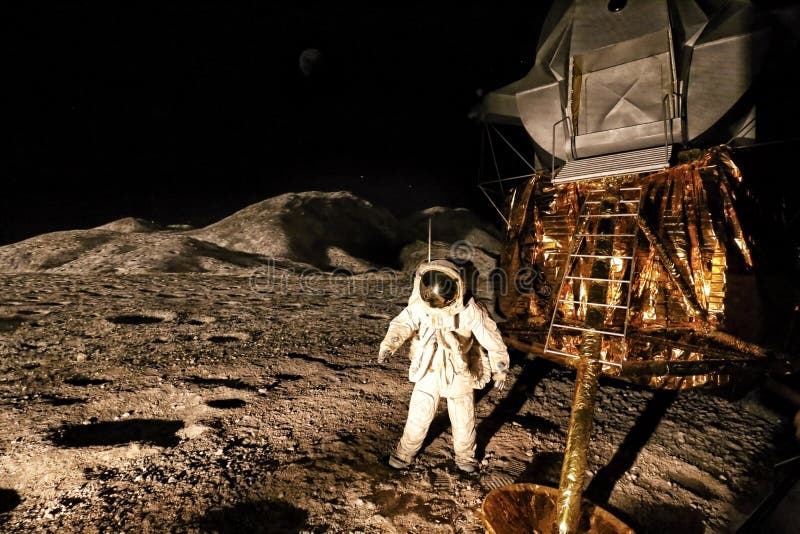

Kennedy "of landing a man on the Moon and returning him safely to the Earth" before the end of the decade. Apollo 11 effectively proved US victory in the Space Race, by fulfilling a national goal proposed in 1961 by President John F. When Armstrong first stepped onto the lunar surface, he famously said: "That's one small step for man, one giant leap for mankind." It was broadcast live to an estimated 530 million viewers worldwide. On July 20, 1969, Armstrong and Apollo 11 Lunar Module (LM) pilot Buzz Aldrin became the first people to land on the Moon, and the next day they spent two and a half hours outside the Lunar Module Eagle spacecraft while Michael Collins remained in lunar orbit in the Apollo Command Module Columbia. During training for Armstrong's second and last spaceflight as commander of Apollo 11, he had to eject from the Lunar Landing Research Vehicle moments before a crash. During this mission with pilot David Scott, he performed the first docking of two spacecraft the mission was aborted after Armstrong used some of his re-entry control fuel to stabilize a dangerous roll caused by a stuck thruster. He made his first spaceflight as command pilot of Gemini 8 in March 1966, becoming NASA's first civilian astronaut to fly in space. Air Force's Man in Space Soonest and X-20 Dyna-Soar human spaceflight programs.Īrmstrong joined the NASA Astronaut Corps in the second group, which was selected in 1962.
Picture of first man on the moon series#
He was the project pilot on Century Series fighters and flew the North American X-15 seven times. After the war, he completed his bachelor's degree at Purdue and became a test pilot at the National Advisory Committee for Aeronautics (NACA) High-Speed Flight Station at Edwards Air Force Base in California. In September 1951, while making a low bombing run, Armstrong's aircraft was damaged when it collided with an anti-aircraft cable, strung across a valley, which cut off a large portion of one wing. He saw action in the Korean War, flying the Grumman F9F Panther from the aircraft carrier USS Essex. He became a midshipman in 1949 and a naval aviator the following year. A graduate of Purdue University, he studied aeronautical engineering his college tuition was paid for by the U.S. He was also a naval aviator, test pilot, and university professor.Īrmstrong was born and raised in Wapakoneta, Ohio. "The decision that was made was absolutely correct as far as who went out first, symbolically," Aldrin wrote in his 2014 AMA.Neil Alden Armstrong (August 5, 1930 – August 25, 2012) was an American astronaut, aeronautical engineer, and the first person to walk on the Moon.

So Armstrong climbed down the ladder, followed by his famous "one small step" line. "In all previous missions, if someone, a crew member, was to spacewalk, it was always the junior person, not the space commander who would stay inside," Aldrin wrote.Īt least one team at NASA though the junior person should go out first, Aldrin wrote, "but many people felt the great symbology of the commander. Typically the junior person - Aldrin in this case - would step outside so that the more senior person - Armstrong - would be left safely behind the controls and in a better position to take action in an emergency. In a Reddit AMA to mark the 45th anniversary of the historic mission, Aldrin described the uniqueness of NASA's decision to have Armstrong walk on the moon first. Michael Collins stayed behind in lunar orbit as command module pilot.
:max_bytes(150000):strip_icc()/GettyImages-50661216-9c13ebd9ed094c0794409b419b09fa1f.jpg)
Armstrong was commander of Apollo 11 and Aldrin was the lunar module pilot. Most people assume that NASA always planned for Armstrong to be the first person to step out onto the moon because of his rank. Buzz Aldrin followed about 20 minutes later. July 20, 2019, is the 50th anniversary of the Apollo 11 moon landing when American astronaut Neil Armstrong became the first person ever to plant boots on the dusty lunar surface. Most people assume mission Commander Neil Armstrong was always NASA's first choice to walk on the moon because of his seniority.Īpollo 11 Lunar Module Pilot Buzz Aldrin revealed in a Reddit AMA that in previous moonwalks, it was typical for the junior crewmember to leave the space capsule while the commander remained inside.Īccording to Aldrin, NASA decided Armstrong should walk on the moon first because it was "symbolic."

July 20, 2019, is the 50th anniversary of the Apollo 11 moon landing when American astronaut Neil Armstrong became the first person ever to walk on the moon.


 0 kommentar(er)
0 kommentar(er)
